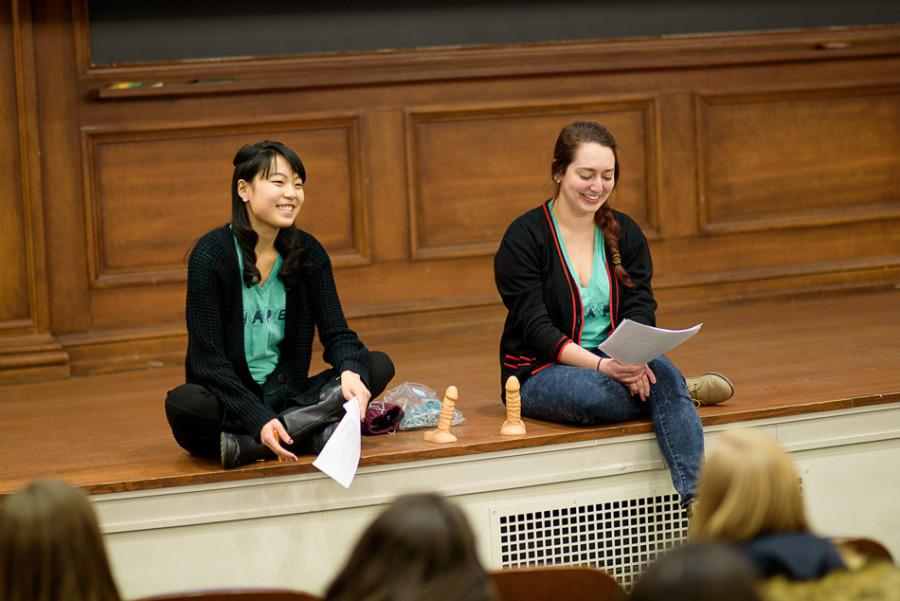Alpha Chi, SHAPE team up for ‘Hooking Up 101’
Sophie Mann/The Daily Northwestern
SESP senior Frances Fu and Communication senior Grace Gabel discuss “hookup culture.” The conversation was hosted by Alpha Chi Omega and Sexual Health and Assault Peer Educators.
February 12, 2015
Alpha Chi Omega partnered with Sexual Health and Assault Peer Educators to host a panel on college hookup culture Wednesday night.
About 30 people attended the panel, “Hooking Up 101,” including many Alpha Chi members and others from the Northwestern community.
The program was an event for Healthy Relationships Week, an annual Alpha Chi campaign promoting sexual health and effective communication in relationships.
“Alpha Chi Omega’s philanthropy is domestic violence awareness,” said Alpha Chi member and SESP senior Frances Fu. “I see our philanthropy as two sided — on the one hand, it is about promoting education about sexual assault, sexual violence and unhealthy relationships. On the other hand, it is about promoting healthy relationships and fostering communication about consent and healthy sexuality.”
Fu, who helped organize the event and was one of the panelists, said Alpha Chi has frequently partnered with SHAPE to prompt conversations on sexual health and educate the student body about concrete methods for expressing one’s feelings and maintaining healthy, consensual relationships.
The event began with conversations about “hookup culture,” which, according to organizers of the panel, creates relationships that may become ambiguous for the individuals involved.
The audience members’ responses to the question, “What does ‘hook up’ mean to you?” ranged from physical contact to sex. Some members of the audience defined it as a one-time interaction, while others said it implied commitment for a long-term relationship. The general consensus was that it is an ambiguous term.
“It is important to discuss with your partner what your boundaries are and communicate what you and your partner each wants,” said Communication senior Grace Gabel, a SHAPE executive member and organizer and panelist of the event.
The discussion progressed to verbal and nonverbal cues of consent for sexual activity, including consideration of alcoholic influence. A majority of the audience said that an “enthusiastic yes” was an acceptable expression of consent. When under the influence of alcohol, the cue could be vague, but there must be consent before sexual activity, some audience members said.
The program included voluntary activities to encourage audience participation, such as holding signs that displayed methods for using a condom. Some activities also aimed to survey students’ opinions on certain issues, such as contrasting perceptions toward female and male students who have “hooked up,” suggesting that stigma is attached to female students who have done so. Yet, a student acknowledged that because most of the audience was female, there is lack of information about the male experience.
In addition to spurring discussions about “hookup culture,” Fu and Gabel broached the topic of sexually transmitted infections, a risk of sexual intercourse. They also informed the audience of resources available at Northwestern University Health Service.
“It was interesting to see what people think about Northwestern’s ‘hookup culture,’ and what kind of concerns other people have, so that I know of the concerns my friends might have and what questions are asked regarding this issue,” Medill junior Caroline Picard said.
Email: [email protected]
Twitter: @jennajeeyoung


